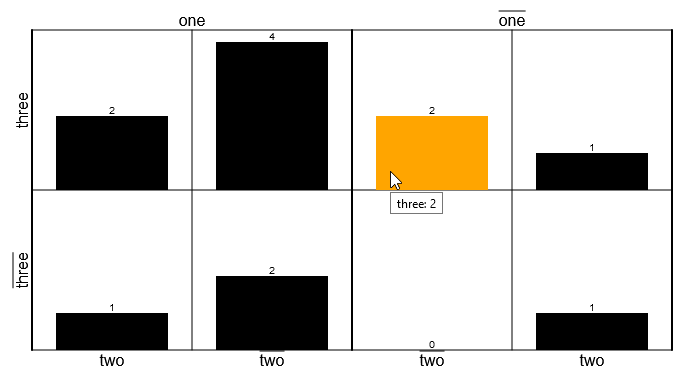This is a HTMLWidget and Plot.ly Dash wrapper around the JavaScript library UpSet.js and an alternative implementation of UpSetR.
This package is part of the UpSet.js ecosystem located at the main Github Monorepo.
# CRAN version
install.packages('upsetjs')
# or
devtools::install_url("https://github.com/upsetjs/upsetjs_r/releases/latest/download/upsetjs.tar.gz")
library(upsetjs)listInput <- list(one = c(1, 2, 3, 5, 7, 8, 11, 12, 13), two = c(1, 2, 4, 5, 10), three = c(1, 5, 6, 7, 8, 9, 10, 12, 13))
upsetjs() %>% fromList(listInput) %>% interactiveChart()see also UpSetJS.Rmd
library(shiny)
library(upsetjs)
listInput <- list(one = c(1, 2, 3, 5, 7, 8, 11, 12, 13),
two = c(1, 2, 4, 5, 10),
three = c(1, 5, 6, 7, 8, 9, 10, 12, 13))
ui <- fluidPage(
titlePanel("UpSet.js Shiny Example"),
upsetjsOutput("upsetjs1"),
)
server <- function(input, output, session) {
# render upsetjs as interactive plot
output$upsetjs1 <- renderUpsetjs({
upsetjs() %>% fromList(listInput) %>% interactiveChart()
})
}
# Run the application
shinyApp(ui = ui, server = server)
see also Shiny Examples
library(dash)
library(dashHtmlComponents)
library(upsetjs)
app <- Dash$new()
app$layout(
htmlDiv(
list(
htmlH1("Hello UpSet.js + Dash"),
upsetjsDash(id = "upset") %>% fromList(list(a = c(1, 2, 3), b = c(2, 3)))
%>% interactiveChart(),
htmlDiv(id = "output")
)
)
)
app$callback(
output = list(id = "output", property = "children"),
params = list(input(id = "upset", property = "selection")),
function(selection) {
sprintf("You selected \"%s\"", selection$name)
}
)
app$run_server()TODO
see also Dash Examples
the package documentation is located at 

Besides the main UpSet.js plot also Venn Diagrams for up to five sets are supported. It uses the same input formats and has similar functionality in terms of interaction.
listInput <- list(one = c(1, 2, 3, 5, 7, 8, 11, 12, 13), two = c(1, 2, 4, 5, 10), three = c(1, 5, 6, 7, 8, 9, 10, 12, 13))
upsetjsVennDiagram() %>% fromList(listInput) %>% interactiveChart()see also Venn.Rmd
Besides the main UpSet.js plot also a variant of a Karnaugh Map is supported. It uses the same input formats and has similar functionality in terms of interaction.
listInput <- list(one = c(1, 2, 3, 5, 7, 8, 11, 12, 13), two = c(1, 2, 4, 5, 10), three = c(1, 5, 6, 7, 8, 9, 10, 12, 13))
upsetjsKarnaughMap() %>% fromList(listInput) %>% interactiveChart()see also KMap.Rmd
requirements:
- R with packages: devtools, pkgdown
- pandoc
npm i -g yarn
yarn install
yarn sdks vscodeyarn lint
yarn buildyarn style:r
yarn lint:r
yarn check:r
yarn build:ror in R
devtools::load_all()
styler::style_pkg()
lintr::lint_pkg()
devtools::check()
devtools::document()
devtools::build()R Package Website
will be automatically updated upon push
yarn docs:ror in R
devtools::build_site()use release-it
yarn release
Rscript -e "devtools::release()"UpSet.js is a client only library. The library or any of its integrations doesn't track you or transfers your data to any server. The uploaded data in the app are stored in your browser only using IndexedDB. The Tableau extension can run in a sandbox environment prohibiting any server requests. However, as soon as you export your session within the app to an external service (e.g., Codepen.io) your data will be transferred.
If you want to use UpSet.js for a commercial application or in a commercial environment, the commercial license is the appropriate license. Contact @sgratzl for details.
This library is released under the GNU AGPLv3 version to be used for private and academic purposes.
In case of a commercial use, please get in touch regarding a commercial license.




